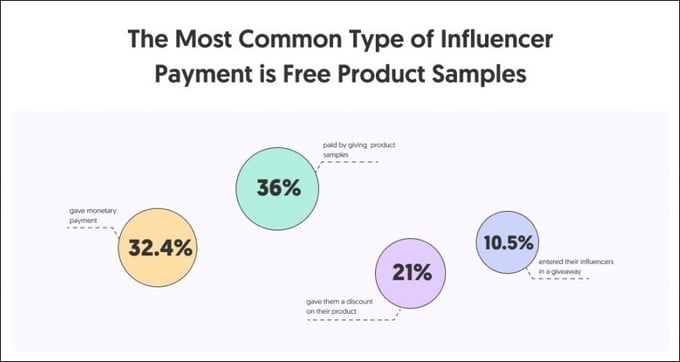If you're a social media influencer with a follower count ranging from 1,000 to 100,000, then you're what's known as a micro-influencer. Maybe you do it to earn some extra money on the side, or maybe you just do it for fun and the money is a nice bonus.
Whatever the case, it's important to keep track of your earnings as a micro-influencer. This will help you manage your money like a pro, avoid unpleasant tax-related headaches and get a clearer idea of how your side hustle is doing. Here's how you can do it easily and effectively.

Use Time-Saving Software
If you're able to consistently keep track of your earnings without any help, then more power to you! But if you're like most people and don't always update your income records after every single transaction, then you can benefit from time-saving financial software designed specifically for freelancers.
High-quality software can help you:
- Create invoices in a matter of minutes.
- Receive payments as quickly as possible.
- Monitor expenses more accurately than before.
- Organize your list of clients in one place.
Kyle Dulay is the director of Collabstr, a platform that helps micro-influencers find paid opportunities faster and more frequently. As he explained: "In most cases, you’re being paid by brands to do some sort of work for them, so when it’s time for payment, don’t just accept a PayPal transfer and be done with it. Use one of the many free invoice generators online and send the company a legitimate invoice that you can then file away into a folder."
Some widely-used (and totally free) choices include Wave, ZipBooks and SlickPie, while popular paid options include QuickBooks, FreshBooks and Xero.
A major bonus of using any of these apps is that when you use them to bill clients, the payments they make will be automatically recorded.
Remember to Record Expenses
It's easy to forget that expense tracking goes hand in hand with income tracking, but it's crucial nonetheless. Here's why: If you make $400 per year or more as a self-employed micro-influencer, then you're required to file self-employment taxes as per IRS guidelines.
And once you start filing those taxes, you'll soon see that the more deductions you can get in the form of business-related expenses, the less you'll have to pay.
As social media coach Mila Holmes revealed in a viral TikTok video, "YouTubers do clothing hauls on their channels so that they can write off the clothing on their taxes. They literally get all these cool clothes, make a video of it so it's considered work and then they get to write it off. THAT'S SO COOL."
Justin Green, founder of the financial advisory firm Assist FP, agrees: "Keep receipts and track any expenses incurred to create [your] income as those expenses can be deducted from the income to reduce the overall tax liability."
So, the smartest thing you can do is keep meticulous records of all expenses related to your micro-influencer status. Did you have to buy a new photo prop in order to create a sponsored post? Record it as a business expense. Did you have to spend $20 on gas in order to drive to meet a brand representative? Record it as a business expense. Did you have to buy products with your own money to create a review video? You get the idea.
Keeping track of your expenses is even easier if you have a credit card reserved exclusively for making business purchases. That way you won't have to guess which of your purchases were business-related and which weren't, and you can even link your card to your chosen financial software for automatic (read: effortless) recording.
Track Non-Monetary Income, Too
For people who aren't influencers (micro-, mega- or otherwise), the idea of non-monetary income may be a foreign one. But for those who are, it couldn't be more ordinary. After all, 36 percent of brands pay influencers with product samples, 21 percent pay with discounts and 10.5 percent pay with giveaway entries, leaving just 32.4 percent who actually pay in cash. 
Source
So chances are that most of the brands you work with will want to pay you in something other than money.
What you may not know is that your non-monetary income needs to be tracked, and if a product or gift you receive is worth more than $100, then it will likely need to be reported to the IRS too.
So remember to make a note of the non-cash compensation you receive, including things such as:
- Clothes
- Cosmetics
- Accessories
- Camera gear
- Tech products
- Photo or video editing software
Even if the non-monetary gifts you receive aren't valuable enough to require taxation, you'll still benefit from keeping a record of what items your clients have given you and when.
Stay On Top of Taxes Year-Round
A key aspect of accurately tracking your earnings as a micro-influencer is making sure to stay on top of your taxes.
That's because micro-influencers may be required to pay estimated taxes on a quarterly basis. This means that if you're not making those quarterly payments to the IRS, you won't have a clear idea of how much of your earnings you'll actually get to keep (and may be subject to penalties too).
How do you know if you need to pay estimated taxes? As per the IRS, "Individuals, including sole proprietors, partners, and S corporation shareholders, generally have to make estimated tax payments if they expect to owe tax of $1,000 or more when their return is filed." Corporations typically must also do so "if they expect to owe tax of $500 or more when their return is filed."
If you're unsure which category you fall under, be sure to review business entity types. And if you haven't created an LLC for your influencer side hustle, it's time to do some research and find out if you should.
Siobhán Alvarez, founder of Mimosas & Motherhood and Budget Baby Budget, says she recommends "that influencers create an LLC and open a business checking account." That's because doing so "not only protects your personal information, but keeps all of your business expenses and income separate, making it much easier for tax purposes."
To get a firm answer on whether or not you need to pay estimated taxes as a micro-influencer, we recommend using your favorite tax software to find out (TurboTax Self-Employed, H&R Block Self-Employed and TaxSlayer Self-Employed are all well-rated options).
And if you do have to pay estimated taxes, Right Choice Account Solutions owner and founder Albert Hurston recommends setting aside 25 to 30 percent of your income because "this would help to set aside enough money to cover federal taxes, state taxes, self-employment taxes, etc."
Use a Handy Worksheet
Automated software can be a fantastic tool, but at the end of the day, you shouldn't underestimate the power of a simple worksheet. Just fill it out every time you receive a payment or make a purchase, then regularly cross-check it with your chosen financial software to guarantee complete accuracy across the board.
Doing so will ensure that your income is recorded in more than one place so you'll never be left in the dark about your earnings.
As you can see, tracking your earnings as a micro-influencer doesn't need to be complicated. With just a little extra effort and the help of some nifty tools, you can be well on your way to precisely monitoring your income, getting more tax write-offs and taking your side hustle to the next level.
Be sure to check out our free download to get you started on tracking your earnings.

